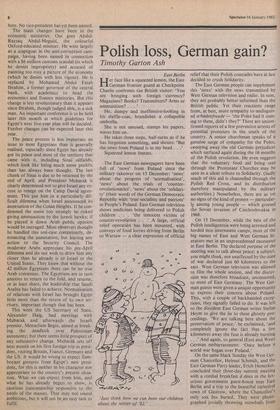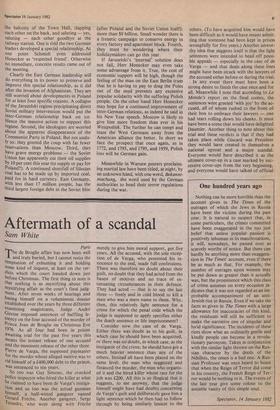Polish loss, German gain?
Timothy Garton Ash
East Berlin er face like a squeezed lemon, the East IGerman frontier guard at Checkpoint Charlie confronts the British visitor: 'You are bringing with foreign currency? Magazines? Books? Transmitters? Arms or ammunition? . . . '
He, dumpy and inoffensive-looking in his duffle-coat, brandishes a collapsible umbrella.
She is not amused, stamps his papers, waves him on.
He takes three steps, half-turns as if he has forgotten something, and shouts: 'But the news from Poland is in my head . .
Squeezed lemon freezes.
The East German newspapers have been full of 'news' from Poland since the military takeover on 13 December: `news' about the progress of `normalisation', `news' about the trials of 'counter- revolutionaries', 'news' about the 'solidari- ty' (their word) of the German Democratic Republic with 'true socialists and patriots' in People's Poland. East German television shows medicines being delivered to Polish children . . . 'the innocent victims of counter-revolution . . .' A large, official relief operation has been mounted, with convoys of food lorries driving from Berlin to Warsaw — a clear expression of official
`Just think how we can bore our children about the winter of '82.'
relief that their Polish comrades have at last decided to crush Solidarity.
The East German people can supplement this 'news' with the news transmitted by West German television and radio. In sum, they are probably better informed than the British public. Yet their reactions range from, at best, mute sympathy to undisguis- ed schadenfreude — 'the Poles had it com- ing to them, didn't they?' There are uncon- firmed reports of a few preventive arrests of potential protesters in the south of the country. A senior churchman speaks of a genuine surge of sympathy for the Poles, sweeping away the old German prejudices which surfaced again during the 16 months of thb Polish revolution. He even suggests that the voluntary food aid being sent thfough the Protestant Churches may be seen as a silent tribute to Solidarity. (Sadly much of this aid is channelled through the Polish Red Cross, and its distribution therefore manipulated by the military authorities.) Nonetheless, there are as yet no signs of the kind of protest — particular- ly among young people — which greeted the Soviet invasion of Czechoslovakia in 1968.
On 13 December, while the best of the Polish intelligentsia were being arrested and herded into internment camps, most of the big names of East and West German lit- erature met in an unprecedented encounter in East Berlin. The declared purpose of the meeting was to talk about peace: a subject, you might think, not unaffected by the state of war declared just 60 kilometres to the east. West German television was allowed to film the whole session, and the discus- sion was therefore broadcast, uncensored, to most of East Germany. The West Ger- man guests were given a unique opportunity to express their concern about Poland. This, with a couple of backhanded excep- tions, they signally failed to do. It was left to the dissident East German writer Stefan Heym to give the lie to these ghostly pro- ceedings. 'We are talking here about the preservation of peace,' he exclaimed, 'and completely ignore the fact that a few kilometres away the fuse is already burning . . .' And again, to general (East and West) German embarrassment: 'Once before a world war began over Poland.'
On the same black Sunday the West Ger- man Chancellor, Helmut Schmidt, and the East German Party leader, Erich Honecker, concluded their three-day summit meeting with a cordial breakfast a deux in the lux- urious government guest-house near East Berlin and a trip to the beautiful cathedral town of Gustrow, where the Chancellor's only son lies buried. They were photo- graphed jovially throwing snowballs froth
the balcony of the Town Hall, slapping each other on the back, and saluting — yes, saluting — each other goodbye at the railway station. One is told the two German leaders developed a special relationship. At one point Schmidt even addressed Honecker as 'respected friend'. Otherwise no immediate, concrete results came out of the meeting.
Clearly the East German leadership will do everything in its power to preserve and improve this special relationship, as it did after the invasion of Afghanistan. They are still worried about developments in Poland for at least four specific reasons. A collapse of the Jaruzelski regime precipitating direct Soviet military intervention would put the inter-German relationship back on ice. Hence the massive action to support this regime. Second, the ideologists are worried about the apparent disappearance of the Communist Party in Poland. But not undu- ly so: they greeted the coup with far fewer reservations than Moscow. Third, they have grave energy problems — the Soviet Union has apparently cut their oil supplies by 10 per cent this year (to supply or pay for Poland?). A continued shortfall of Silesian coal has to be made up by imported coal, Paid for in hard currency. East Germany, with less than 17 million people, has the third largest foreign debt in the Soviet bloc
(after Poland and the Soviet Union itself): more than $9 billion. Small wonder there is a frenetic campaign to conserve energy in every factory and apartment block. Fourth, they must be wondering where their holidaymakers can go this year.
If Jaruzelski's 'internal' solution does not fail, Herr Honecker may even take some advantage from it. True, the cost of economic support will be high, though the feeling of the man on the East Berlin tram that he is having to pay to drag the Poles out of the mud prevents any excessive popular solidarity with the suffering Polish people. On the other hand Herr Honecker- may hope for a continued improvement of inter-German relations, as indeed he said in his New Year speech. Moscow is likely to give him more freedom than ever in his Westpolitik. The further he can tempt and tease the West Germans away from the American alliance the better. In short we face the prospect that once again, as in 1772, and 1793, and 1795, and 1939, Polish loss will be German gain.
Meanwhile in Warsaw posters proclaim- ing martial law have been titled, at night, by an unknown hand, with one word, Bekannt- machung, the word used by the German authorities to head their terror regulations during the war.



































 Previous page
Previous page